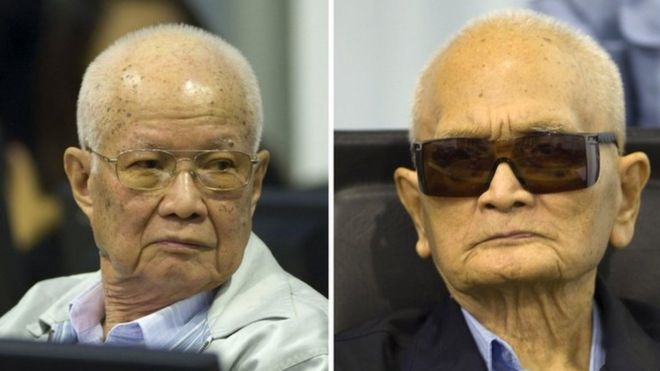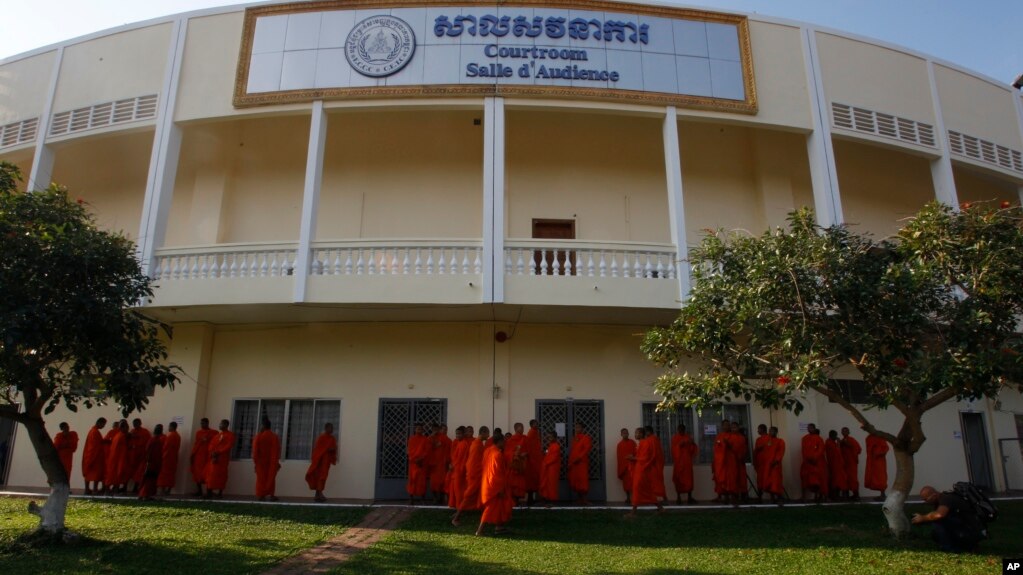Elaboration on a Crimes Against Humanity Trial
"Let bygones be bygones. To say who is wrong and who is right and who is doing this and who is doing that, et cetera ... "
"Please don't stir things up."
"It is normal that those who have lost their families, that they -- what to say -- feel some resentment."
"Sorry, very sorry."
"Please have some sympathy with me. I need to have some rest."
"[I was] not aware of the heinous acts committed by other leaders."
Khieu Samphan 87, Khmer Rouge head of state, Cambodia
"We are very sorry not only for the lives of the people of Cambodia, but even the lives of all animals that suffered because of the war."
"We only killed the bad people, not the good."
Nyon Chea, 92, Khmer Rouge leader
 |
| The pair are already serving life sentences Nuon Chea, right, Khieu Samphan, left Reuters |
Well, thanks to the vigorous efforts of Nuon Chea, second in command after Pol Pot as leader of the Khmer Rouge from 1975 to 1979, a paroxysm of mass murder overtook Cambodia when 1.7 million of its population were killed in a trajectory of violence that the Communist Khmer Rouge unleashed on the people of Cambodia. That trajectory was a familiar one, followed in lock-step with the experiment in social engineering that consumed the Soviet Union in its massive effort to produce a 'socialist' economy and society.
The Communist Khmer Rouge, taking its cue from the USSR was determined to transform the country into an agrarian utopia. It began just as Stalin did, by killing the educated class and reorganizing the country into labour camps, forcing the population to bow to the rewards of collectivization of efforts to benefit all, particularly their leaders. An international tribunal delivered a verdict on Friday indicting the two surviving members of the Cambodian Communist leadership.
That verdict from the tribunal declared the Khmer Rouge to have committed genocide against the Muslim Cham minority and the ethnic Vietnamese. It took a decade for the tribunal, named the Extraordinary Chambers in the Courts of Cambodia, supported by the United Nations, to sift through hundreds of thousands of document pages, to call on hundreds of witnesses and to hear exhaustive detail of the Khmer Rouge killing fields. All of this judicial activity came in with a steep price tag of $300-million.
Eventually the Khmer Rouge were ousted when a Vietnamese invasion challenged their primacy, sending them to an escape in Cambodian jungles as a defeated insurgent army. Nuon Chea and Khieu Samphan, the two men standing trial before the tribunal, defected in 1998. Prime Minister Hun Sen, himself a low-ranked Khmer Rouge cadre, welcomed the two with friendly overtures, counselling the country to "dig a hole and bury the past".
Both men in their senior years felt they were entitled to believe that the past was past and they could relax as simple citizens of Cambodia, enjoying the peace and quiet of those golden years in the presence of their children and grandchildren. They repaired to the remote border town of Pailin which had absorbed former Khmer Rouge members, and there they found comfort. Until 2007 when they were arrested and placed in prison to await trial.
The verdict passed down by the court mentioned murder, extermination, enslavement, imprisonment, torture, persecution and inhumane acts against human dignity, all of which these two elderly men were charged with and found guilty of committing. Forced labour, death threats, torture were all part of the narrative of their past occupation. Nuon Chen was fund guilty of genocide against both the Cham and the Vietnamese, while Khieu Samphan was held to be guilty of genocide against the Vietnamese, and both found guilty of crimes against humanity.
They were sentenced to life imprisonment. Which would have displeased them mightily. But following their exploits in destroying almost two million lives, there was a peaceful interim when they believed that 'bygones would be bygones', until justice finally caught up with them. Too late, but better than never....
When millions of people are killed and millions more have had their lives torn asunder, ordinary legal processes, or even extraordinary ones, are inevitably impotent to render anything resembling real justice to the legions of victims.
Many victims inevitably will be disappointed. What tribunals can do, however, is to deliver a form of symbolic justice by identifying the masterminds of the atrocities, and holding some of them to account.
For some victims, that is enough, and more justice than they ever expected to receive. former crime scene investigator Craig Etcheson
 |
| Cambodian Buddhist wait outside the court hall before they attending the hearings against two former Khmer Rouge senior leaders, at the U.N.-backed war crimes tribunal on the outskirts of Phnom Penh, Cambodia, Friday, Nov. 16, 2018. |
Labels: Cambodia, Justice, Khmer Rouge, Killing Fields

<< Home